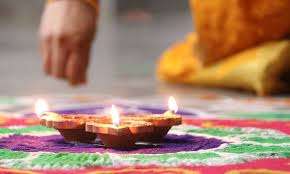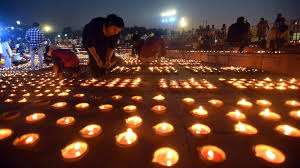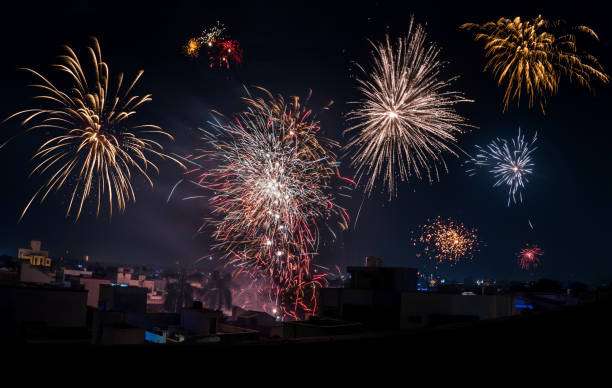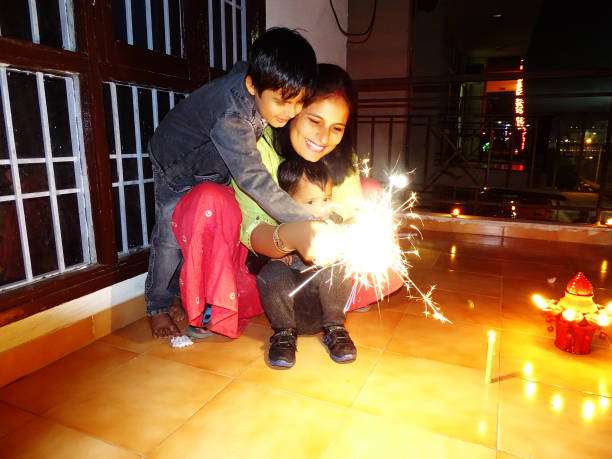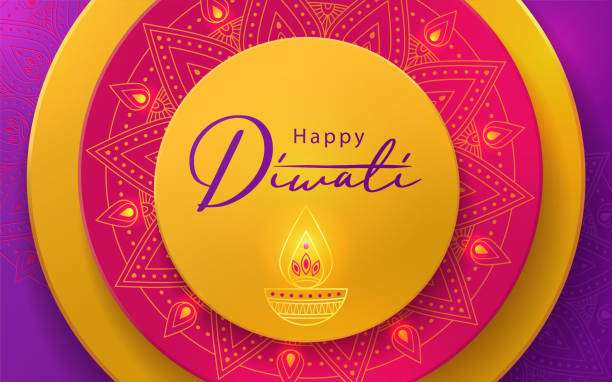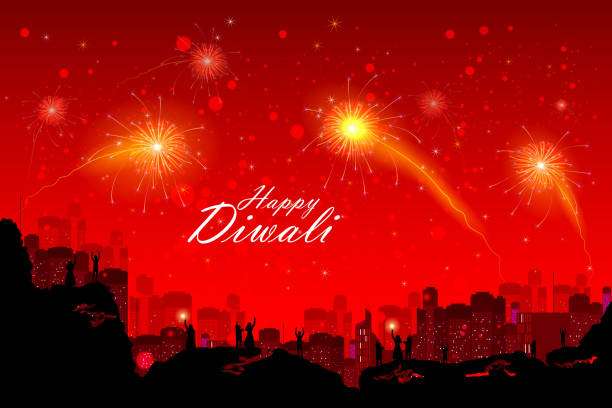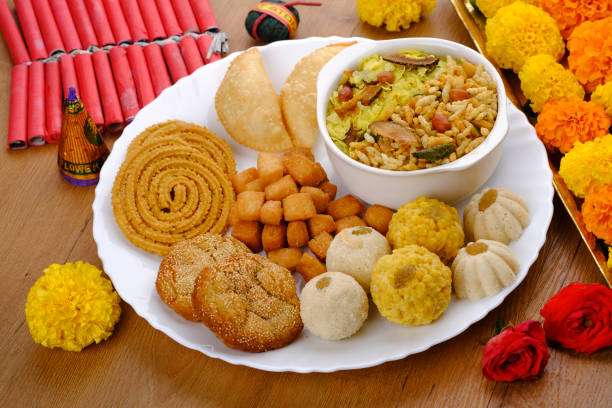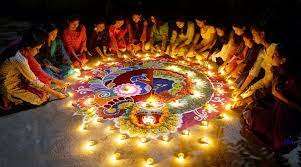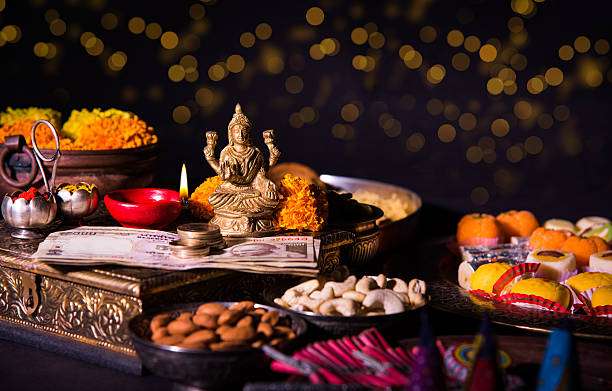Celebrate Diwali - The Festival of Lights
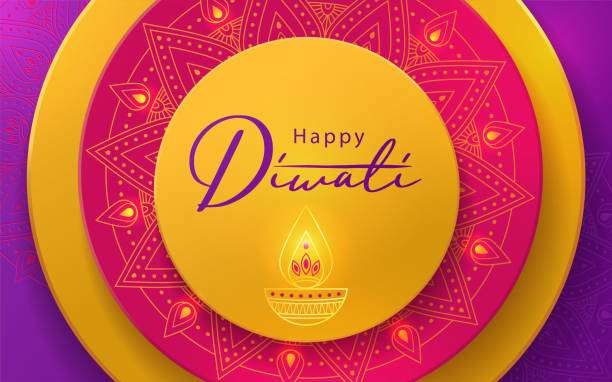
September 12, 2023
Diwali, the Hindu festival of lights, is one of the most widely celebrated and revered festivals in India. Representing the victory of light over darkness, knowledge over ignorance, and good over evil, it is a time of renewal and a reaffirmation of life’s greatest values. From the days leading up to the festival to the day itself, Diwali is celebrated in a variety of traditional and modern ways, truly embodying its colorful and joyous spirit. In this blog post, we will explore the answers to the questions: Why is Diwali celebrated, what is Diwali, when is it celebrated, how it is celebrated, and what is the main message of Diwali?
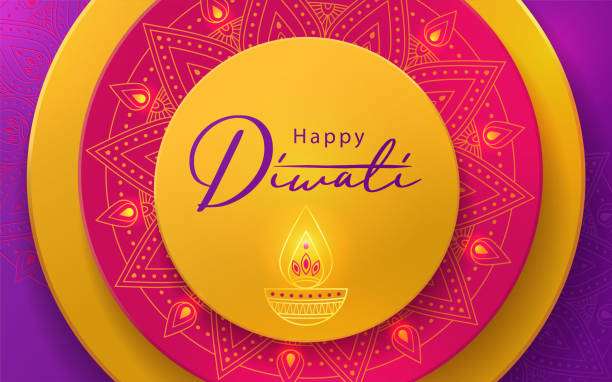
Why Is Diwali Celebrated?
Diwali is a major religious festival celebrated by Hindus, Jains, Sikhs, and some Buddhists, both in India and around the world. The festival symbolizes the victory of light over darkness, good over evil, knowledge over ignorance, and hope over despair. It is also associated with the worship of Goddess Lakshmi and commemorates the return of Lord Rama in Northern India. In some parts of South India, the festival celebrates Lord Krishna’s victory over the demon Narakasura. For Jains, the festival marks the spiritual awakening of Lord Mahavira, and for Sikhs, it celebrates the release of the sixth Guru, Guru Hargobind Sahib, from Mughal captivity. Diwali is a time for families to come together, exchange gifts, share meals, clean and decorate their homes, and strengthen bonds.
Diwali, also known as Deepavali, is a significant Hindu festival celebrated by millions of people around the world. The festival carries different cultural and historical meanings, but the most common reasons for celebrating Diwali include:
Victory of Light over Darkness: Diwali symbolizes the triumph of light over darkness, both literally and metaphorically. It represents the victory of good over evil, knowledge over ignorance, and hope over despair.
The Return of Lord Rama: In the northern parts of India, Diwali commemorates the return of Lord Rama, his wife Sita, and his loyal companion Hanuman to their kingdom of Ayodhya after defeating the demon king Ravana.
Goddess Lakshmi: Diwali is also associated with the worship of Goddess Lakshmi, the Hindu goddess of wealth and prosperity. People believe that on this day, she visits homes that are clean and well-lit, bringing blessings of prosperity and abundance.
Celebration of Lord Krishna: In some regions, particularly in South India, Diwali is linked with the legend of Lord Krishna defeating the demon Narakasura, liberating 16,000 captive princesses.
Jain Tradition: For Jains, Diwali marks the spiritual awakening or nirvana of Lord Mahavira, the 24th Tirthankara (spiritual teacher) of Jainism.
Sikh Tradition: For Sikhs, Diwali holds special significance because it marks the release of Guru Hargobind Sahib, the sixth Guru, along with 52 other princes, from captivity under the Mughal emperor Jahangir.
Family and Community Bonding: Diwali is a time for families to come together, exchange gifts, share meals, and strengthen bonds.
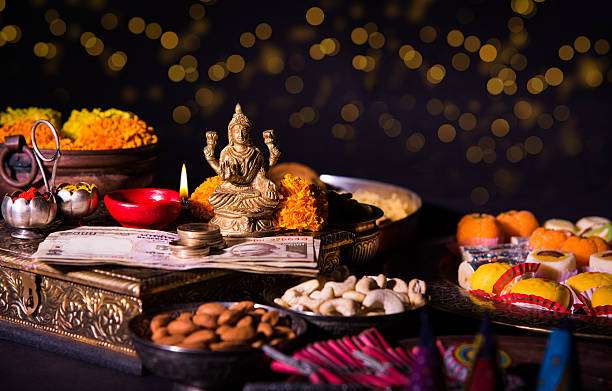
Renewal and Cleansing: In addition to lighting lamps and candles, people clean and decorate their homes. This symbolizes the cleansing of impurities, both physical and spiritual, and the preparation for a fresh start.
Cultural Significance: Diwali is celebrated not only by Hindus but also by Jains, Sikhs, and some Buddhists. It has become a cultural festival that transcends religious boundaries, celebrated by people of various faiths in many parts of the world.
It's important to note that while these are the common reasons for celebrating Diwali, the festival may hold additional significance or unique regional variations based on specific beliefs, traditions, and legends associated with different communities and regions in India and other countries where it's observed.
What is Diwali?
Diwali is one of the most celebrated and important festivals in Hinduism, as well as being observed in Jainism, Sikhism, and some Buddhist cultures. This festival of light is held over five days, although the day of major observance may vary due to regional and cultural differences. It symbolizes the victory of light over darkness, good over evil, and knowledge over ignorance. There are various legends told about this festival, with the most common being about Lord Rama returning to Ayodhya, Lord Krishna defeating Narakasura, and Lord Mahavira attaining nirvana. Decorations, lamps, candles, lights, and special dishes and sweets all feature in the celebration, and gifts are exchanged to show love and appreciation. Fireworks and firecrackers also occur in some regions, as do prayer and puja rituals to seek blessings. Families and communities come together for festive meals and charitable acts, and there are many regional and cultural variations to the observances. All in all, Diwali is a time of joy, unity, and spiritual reflection as we celebrate the transition from darkness to light.
Diwali, also known as Deepavali, is one of the most important and widely celebrated festivals in Hinduism. It is also observed by Jains, Sikhs, and some Buddhists. The festival usually lasts for five days, although the main day of celebration varies depending on the region and specific cultural traditions.
Here's an overview of the significance and customs associated with Diwali:
1. Significance:
Victory of Light over Darkness: Diwali symbolizes the triumph of light over darkness, good over evil, and knowledge over ignorance. It is a celebration of the positive forces in the world.
Various Legends: Different regions in India and different communities have specific legends associated with Diwali. The most common are the return of Lord Rama to Ayodhya after defeating Ravana, the defeat of the demon Narakasura by Lord Krishna, and the attainment of nirvana by Lord Mahavira in Jainism.
2. Celebrations:
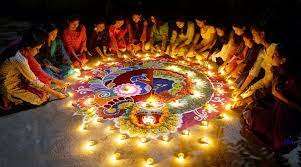
Decorations: Homes and public spaces are decorated with colorful rangolis (intricate designs made with colored powders), lamps, candles, and fairy lights. This is to create a festive and welcoming atmosphere.
Lamps and Candles: Lighting lamps and candles is a central aspect of Diwali. It represents the dispelling of darkness and the spreading of light and positivity.
Sweets and Feasting: Families prepare special dishes and sweets, exchange them with neighbors and relatives, and enjoy festive meals together.
Gifts and Exchanges: People exchange gifts as a symbol of love and affection. It's a way of showing appreciation and strengthening bonds.
Fireworks and Firecrackers: In some regions, especially in India, fireworks and firecrackers are a significant part of the celebration, adding to the festive atmosphere.
Prayers and Puja: Families gather for prayers and perform special pujas (religious rituals) to seek blessings from deities associated with Diwali, such as Goddess Lakshmi for wealth and prosperity.
Charitable Acts: Many people engage in acts of charity and goodwill during Diwali, helping those in need and spreading kindness.

3. Regional and Cultural Variations:
Different regions and communities have unique customs and legends associated with Diwali, leading to a rich tapestry of traditions across India and in various parts of the world where Diwali is celebrated.
Overall, Diwali is a time of joy, unity, and spiritual reflection. It is a time for families to come together, for communities to celebrate together, and for individuals to reflect on the triumph of light and goodness over darkness and negativity.
When is Diwali celebrated?
Diwali, also known as Deepavali, is a festival that falls on different dates each year, following the Hindu lunar calendar. The exact date of celebration depends on the region and the traditions of the community, and changes depending on the specific lunar month each year. To determine the date of Diwali in a particular year, I need to know the current year. My knowledge covers up to September 2021, so if it is after that, please let me know the current year.
Diwali, also known as Deepavali, is celebrated on different dates each year, as it follows the Hindu lunar calendar. The festival typically falls in either October or November. The exact date varies depending on the lunar month and the specific traditions followed by different regions and communities.
To provide a more specific date for Diwali in a given year, I would need to know the current year. If you provide me with the current year, I can calculate the approximate date of Diwali for that year based on the lunar calendar. Keep in mind that my knowledge is current up until September 2021, so if it is after that date, please let me know the current year.
How is Diwali celebrated?
Diwali, also known as Deepavali, is celebrated with great enthusiasm and a variety of customs. To prepare for the festival and welcome the goddess of wealth Lakshmi, homes are thoroughly cleaned and decorated with rangolis, diyas, candles, fairy lights, and flowers. Lighting lamps and candles symbolizes the triumph of light over darkness and the spread of positivity. Special sweets and dishes are prepared and exchanged with relatives and neighbours. Gifts are also exchanged to show love and appreciation for one another. Prayers and pujas are performed to seek blessings from deities associated with Diwali. Fireworks and firecrackers also add to the festive atmosphere. Acts of charity and goodwill are recommended, as well as family time and bonding. Cultural events such as dance performances and music concerts are organized to celebrate the festival. These traditions may vary depending on regional, cultural, and personal preferences. Diwali is a diverse and vibrant festival that is celebrated with unique flair in different parts of the world.
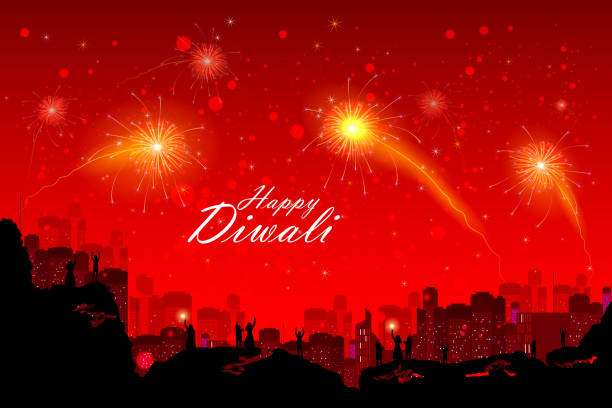
Diwali, also known as Deepavali, is celebrated with great enthusiasm and a variety of customs. Here are some of the common ways in which Diwali is celebrated:
Cleaning and Decoration: Weeks before Diwali, homes are thoroughly cleaned and tidied to welcome the goddess of wealth, Lakshmi. This signifies the removal of negativity and the preparation for a fresh start. Homes are decorated with rangolis (intricate designs made with colored powders), candles, diyas (clay lamps), fairy lights, and flowers.
Lighting of Lamps and Candles: Lighting lamps and candles is central to Diwali. It symbolizes the triumph of light over darkness and the spread of positivity. Diyas (clay lamps) are placed around homes, on windowsills, balconies, and in courtyards. In some areas, entire buildings are illuminated.
Sweets and Feasting: Special dishes and sweets are prepared, such as ladoos, barfis, and various regional delicacies. Families exchange these treats with neighbors and relatives. Festive meals are prepared and enjoyed together. This is a time for families to come together and bond over food.
Gift Giving: Exchanging gifts is a common tradition during Diwali. It's a way of showing love, affection, and appreciation for one another. Gifts can range from clothes and jewelry to sweets and household items.
Prayers and Puja: Families gather for prayers and perform special pujas (religious rituals) to seek blessings from deities associated with Diwali, particularly Goddess Lakshmi and Lord Ganesha. Temples are beautifully decorated and hold special ceremonies.
Fireworks and Firecrackers: In many regions, especially in India, fireworks and firecrackers are a significant part of the celebration. They add to the festive atmosphere and are seen as a way to ward off evil spirits.
Charitable Acts: Acts of charity and goodwill are encouraged during Diwali. Many people choose to help those in need, supporting various causes and spreading kindness.
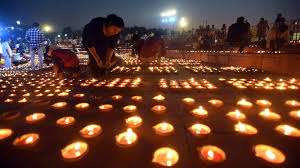
Family Time and Bonding: Diwali is a time for families to come together, exchange stories, share laughter, and strengthen their bonds. It's a time of unity and togetherness.
Cultural Events and Performances: Many communities organize cultural events, dance performances, and music concerts to celebrate Diwali. These events showcase the rich cultural heritage associated with the festival.
It's important to note that while these are common ways of celebrating Diwali, there can be variations in traditions and customs based on regional, cultural, and personal preferences. Diwali is a diverse and vibrant festival that is celebrated with unique flair in different parts of India and by various communities around the world.
What is the main message of Diwali?
Diwali celebrates the victory of light over darkness, good over evil, and knowledge over ignorance. It is a meaningful festival that emphasizes the importance of positive values, such as seeking wisdom, achieving prosperity, renewing fresh beginnings, and uniting families and communities. People often practice charity and kindness, and celebrate the festival with a spirit of inclusivity, regardless of faith. Diwali is a time to reflect on one's spiritual and material wealth while striving for goodness, knowledge, and abundance.
The main message of Diwali is the triumph of light over darkness, good over evil, and knowledge over ignorance. It is a festival that carries several significant meanings, and its core messages include:
Victory of Light: Diwali symbolizes the victory of light over darkness. The lighting of lamps and candles signifies the dispelling of darkness and the spreading of illumination and positivity.
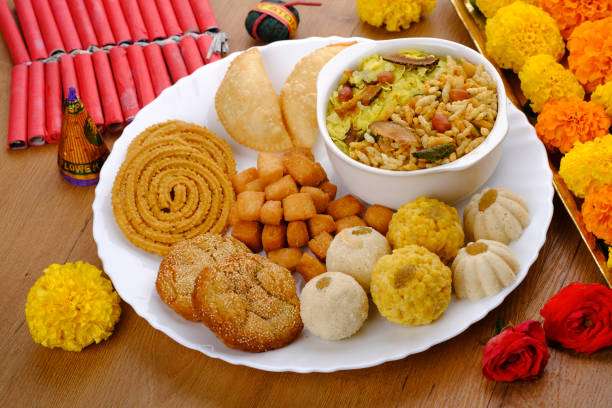
Triumph of Good over Evil: Diwali represents the victory of good over evil. This can be seen in the various legends associated with the festival, such as the return of Lord Rama after defeating the demon king Ravana, or the defeat of the demon Narakasura by Lord Krishna.
Knowledge over Ignorance: Diwali also signifies the triumph of knowledge over ignorance. It encourages seeking wisdom, understanding, and enlightenment.
Prosperity and Abundance: The worship of Goddess Lakshmi during Diwali signifies the seeking of prosperity and abundance. It is a time to reflect on one's material and spiritual wealth.
Renewal and Fresh Beginnings: The practice of cleaning homes and creating beautiful decorations signifies the cleansing of impurities and the preparation for a fresh start.
Unity and Togetherness: Diwali brings families and communities together. It's a time for shared meals, celebrations, and the strengthening of bonds.
Acts of Kindness and Charity: Many people engage in acts of charity and goodwill during Diwali, emphasizing the importance of helping those in need and spreading kindness.
Cultural Diversity and Inclusivity: Diwali is celebrated not only by Hindus but also by Jains, Sikhs, and some Buddhists. It is a festival that transcends religious boundaries and is celebrated by people of various faiths in many parts of the world.
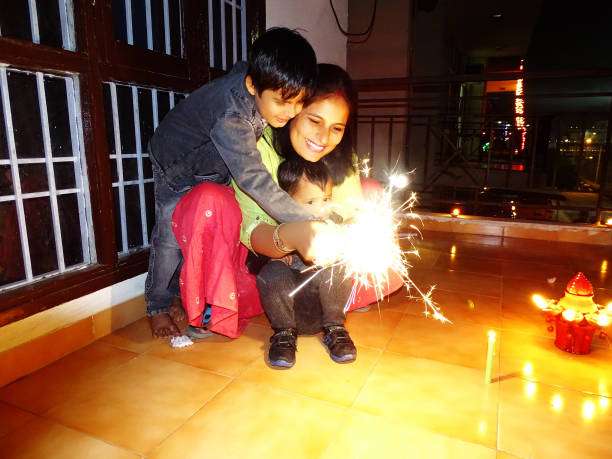
Overall, Diwali is a time for reflection, celebration, and the reaffirmation of positive values. It encourages individuals and communities to strive for goodness, knowledge, and prosperity, while fostering a sense of unity and compassion.
Summary
- Diwali is a widely celebrated Hindu festival in India that symbolizes victory of light over darkness, renewal, and reaffirmation of life's greatest values.
- It is celebrated in traditional and modern ways and is celebrated by Hindus, Jains, Sikhs, and some Buddhists in India and around the world.
- The festival is associated with the worship of Goddess Lakshmi and commemorates the return of Lord Rama in Northern India and Lord Krishna's victory over the demon Narakasura in South India. It also marks the spiritual awakening or nirvana of Lord Mahavira in Jainism and the release of Guru Hargobind Sahib from Mughal captivity in Sikhism.
- Families celebrate by coming together, exchanging gifts, sharing meals, cleaning and decorating their homes, and strengthening bonds, symbolizing renewal and cleansing of impurities and preparation for a fresh start. It is a cultural festival that transcends religious boundaries and is observed not only by Hindus but also by other faiths.
Celebrate this Diwali with a bang!
We at Mitansh Gangani are excited to bring you our latest product. Just as the British star Samantha Bond, known for her role in Downton Abbey, has recently been in the spotlight, our product is also gaining attention for its unique features.
Just like Samantha reassured her fans about her well-being on the ITV show, Loose Women, we want to reassure you about the quality of our products. We understand the concerns of our customers and are committed to providing the best services.
Just as viewers were distracted by Samantha's appearance on the show, we hope our new product will also grab your attention. We're confident that will be a game-changer in the market.
Stay tuned for more updates and don't forget to check out our website https://mitanshgangani.com/ for more details.
Wishing you all a very Happy and Prosperous Diwali!
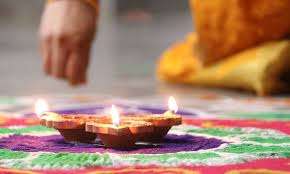
#MitanshGangani #403Forbidden #Diwali #SamanthaBond #LooseWomen
FAQS
1. What is Diwali?
Answer: Diwali is an ancient Hindu festival celebrated in India and other parts of South Asia to mark the victory of good over evil, or light over darkness.
2. When is Diwali celebrated?
Answer: Diwali is typically celebrated for five consecutive days in late October or early November each year.
3. How is Diwali celebrated?
Answer: Diwali is celebrated with fireworks, lighting of candles and oil lamps, feasting, and exchanging of gifts.
4. What is the main message of Diwali?
Answer: The main message of Diwali is to remember that light overcomes darkness and good will always triumph over evil.
